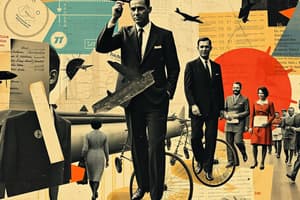Podcast
Questions and Answers
What type of power is based on a person's formal position within an organization?
What type of power is based on a person's formal position within an organization?
- Expert Power
- Legitimate Power (correct)
- Coercive Power
- Referent Power
Which of the following power bases are considered personal sources of power?
Which of the following power bases are considered personal sources of power?
- Pressure Power and Coalitions
- Expert Power and Referent Power (correct)
- Legitimate Power and Exchange Power
- Reward Power and Coercive Power
What is the primary effect of expert power in an organization?
What is the primary effect of expert power in an organization?
- Improves employee satisfaction and performance (correct)
- Creates dependencies on authority figures
- Leads to increased coercion among peers
- Diminishes the need for teamwork
Which power tactic relies on presenting logical arguments and factual evidence?
Which power tactic relies on presenting logical arguments and factual evidence?
What is the definition of power in an organization?
What is the definition of power in an organization?
What tactic involves increasing support by involving others in decision-making?
What tactic involves increasing support by involving others in decision-making?
Which of these tactics is most likely to backfire when misused?
Which of these tactics is most likely to backfire when misused?
Which base of power relies on the ability to punish non-compliance?
Which base of power relies on the ability to punish non-compliance?
Which power base has shown to be unrelated to employee satisfaction and performance?
Which power base has shown to be unrelated to employee satisfaction and performance?
What type of power depends on one's position within the organizational hierarchy?
What type of power depends on one's position within the organizational hierarchy?
What tactic involves using flattery or praise before making a request?
What tactic involves using flattery or praise before making a request?
Reward Power can be based on which of the following?
Reward Power can be based on which of the following?
Which tactic is NOT considered a base of formal power?
Which tactic is NOT considered a base of formal power?
What is essential for power to manifest in an organizational context?
What is essential for power to manifest in an organizational context?
Which type of power is primarily related to someone’s expertise in a particular area?
Which type of power is primarily related to someone’s expertise in a particular area?
Which of the following is NOT a formal base of power identified in organizations?
Which of the following is NOT a formal base of power identified in organizations?
Which influence tactic is most effective when the audience is highly interested in the outcomes?
Which influence tactic is most effective when the audience is highly interested in the outcomes?
What was the key outcome of the managers who received feedback and training in influence tactics compared to those who did not?
What was the key outcome of the managers who received feedback and training in influence tactics compared to those who did not?
How do individualistic cultures typically view power?
How do individualistic cultures typically view power?
Which influence tactic is likely to backfire?
Which influence tactic is likely to backfire?
What is the impact of having a good relationship between a supervisor and a subordinate on influence attempts?
What is the impact of having a good relationship between a supervisor and a subordinate on influence attempts?
What is an effective approach for downward influence in an organizational hierarchy?
What is an effective approach for downward influence in an organizational hierarchy?
What typically characterizes lateral influence within an organization?
What typically characterizes lateral influence within an organization?
What effect does an inspiring vision have on employees?
What effect does an inspiring vision have on employees?
What characterizes organizational politics?
What characterizes organizational politics?
What type of political behavior falls within the guidelines of acceptable business practices?
What type of political behavior falls within the guidelines of acceptable business practices?
Which of the following is an example of illegitimate political behavior?
Which of the following is an example of illegitimate political behavior?
Which group of individuals is most likely to abuse power?
Which group of individuals is most likely to abuse power?
Which of the following is NOT a feature of political behavior in organizations?
Which of the following is NOT a feature of political behavior in organizations?
How can cultural fit within an organization affect political influence?
How can cultural fit within an organization affect political influence?
What is a consequence of enabling high levels of power in individuals?
What is a consequence of enabling high levels of power in individuals?
What is the primary cause of political behavior in organizations?
What is the primary cause of political behavior in organizations?
Flashcards are hidden until you start studying
Study Notes
Power in Organizations
- Power is the ability to influence the behavior of others to act in accordance with one's wishes.
- Dependence is key to power. A person can only have power over you if they control something you desire.
- Formal Power comes from an individual's position within the organization, including:
- Coercive power: Based on fear of negative consequences for non-compliance.
- Reward power: Based on the ability to distribute valued rewards.
- Legitimate power: Based on the individual's formal position in the organization's hierarchy.
- Personal Power stems from an individual's unique characteristics:
- Expert power: Based on specialized knowledge or skills.
- Referent power: Based on identification with someone seen as having desirable resources or traits.
- Personal power is generally more effective than formal power.
Nine Power Tactics
- Legitimacy: Relying on authority or organizational rules.
- Rational persuasion: Presenting logical arguments and evidence.
- Inspirational appeals: Appealing to values, needs, or aspirations.
- Consultation: Involving others in decision-making.
- Exchange: Offering benefits or favors in exchange for compliance.
- Personal appeals: Appealing to friendship or loyalty.
- Ingratiation: Using flattery or praise.
- Pressure: Using threats or demands.
- Coalitions: Enlisting the support of others.
Political Behavior in Organizations
- Organizational politics refers to the use of power to influence decision-making in a self-serving way, potentially going against organizational norms.
- Political behavior involves activities outside of one's formal role that influence the distribution of advantages – like withholding information, spreading rumors, or leaking confidential information.
- Legitimate political behavior falls within acceptable business practices.
- Illegitimate political behavior uses tactics that are deemed unethical or harmful to the organization.
- Individual factors like a high need for power or a Machiavellian personality can contribute to political behavior.
- Organizational factors contributing to political behavior include limited resources, ambiguity in roles, and a culture of competition or reward for political maneuvering.
Studying That Suits You
Use AI to generate personalized quizzes and flashcards to suit your learning preferences.




